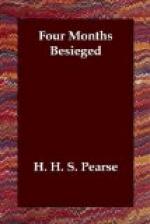We had not, however, done with the enemy by repulsing him at one point. His big guns opened again presently from Blaauwbank and Rietfontein to the west and north. A smaller battery on Long Hill echoed the deep boom from “Long Tom,” who was carrying on a duel with our naval gun, and throwing shells over the town, to burst very near Sir George White’s headquarters. Field-guns from the nek near Lombard’s Kop joined in chorus, shooting with effect on Tunnel Hill, held by the Liverpools, several of whom were hit. Colour-Sergeant Macdonald went out of the bomb-proof to mark where one shell had struck, when another burst on the same spot, and he fell terribly mangled by jagged fragments of iron. His comrades rushed to aid him, but he died in their arms, saying simply, “What a pity it was I went out to see.” In truth the shells did not want looking for to-day. They were falling in rapid succession from one end of Bulwaan on Helpmakaar Hill, where the Devons, thanks to having taken wise precautions in making bomb-proof shelters, suffered little, though “Puffing Billy” turned occasionally to hurl a 94-pounder in that direction when tired of raking Caesar’s Camp and Maiden’s Castle, where the Manchesters had not only their flank exposed to this fire, but were smitten in front by a heavy gun the Boers had mounted on Flat-Top Mountain, some three miles off, and by smaller shells that came from automatic guns hidden among scrub on the nearer slopes across Bester’s Farm. These did little harm, though the repeated thuds of their discharge, like the rapid strokes of a Nasmyth hammer on its anvil, might have shaken the resolution of any but the steadiest troops, seeing that our field-battery on Maiden’s Castle could not for a long time locate the exact hiding-place of those vicious little weapons, and when they did get a chance, the enemy’s heavy artillery replied to their fire with a more persistent cannonade than ever. The Manchesters stood manfully the test of long exposure to this galling storm of iron and lead, their fighting line continuing to hold the outer slopes, where from behind boulders they could overlook the hollow between them and their foes, and get occasionally shots at any Boer who happened to show himself incautiously. That did not happen often, and their chances of effective reply to the bullets or shells that lashed the ground about them were few at first.
When an attack of riflemen did begin to develop with some show of being pressed home, the Manchesters were still lying there ready to meet it with a fire steadier than that of the Boers and if anything more deadly. Being secure from flanking movements, since the Border Mounted Rifles were on their right sweeping round Waggon Hill and some companies of the 60th in support, the Manchesters could devote all their attention to that long front, and beat back every attempt of the Boers to cross the valley where a tributary of the Klip River winds past Bester’s Farm down to the broad flats by Intombi Spruit. These hostile demonstrations were never very determined or long sustained, and they slackened down to nothing for a time just before noon.




